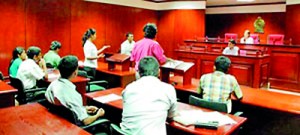Witness an enthralling court drama at APIIT Law School
View(s):APIIT LAW SCHOOL brings you a rare opportunity to witness a mock trial based on the monumental case in UK “R v Ahluwalia”, which changed the definition of the word ‘provocation’ in British legal system.
Kiranjit Ahluwalia (born 1955) is an Indian woman who came to international attention after setting fire to her husband in 1989 in response to ten years of abuse. Her husband died six days later. She was convicted of murder on 7 December 1989 and appealed against her conviction.
The first ground of appeal was that the judge wrongly directed the jury that a plea of provocation depended on establishing a ‘sudden’ loss of self-control; the second was that he failed to take into account that the defendant was suffering from ‘battered woman syndrome’, producing a state of ‘learnt helplessness’. The successful ground of appeal was the third.
Medical evidence available but not used at the first trial showed that the defendant was suffering from a major depressive disorder; this could have provided the basis for a successful plea of diminished responsibility. The conviction was quashed and a retrial ordered. The case has wider significance in relation to the use of provocation pleas based on battered woman syndrome, and the seeming tendency to prefer a plea of diminished responsibility  where a woman is involved. Despite the role of Southall Black Sisters in bringing this case to appeal, cultural issues play no explicit part in the judgment. But where the direction at the original trial tended to minimize the vulnerability of the defendant, the judgment at the Court of Appeal stressed her physical slightness, state of humiliation, and loss of self-esteem, and noted that she remained in an abusive marriage because of her ‘sense of duty as a wife’.
where a woman is involved. Despite the role of Southall Black Sisters in bringing this case to appeal, cultural issues play no explicit part in the judgment. But where the direction at the original trial tended to minimize the vulnerability of the defendant, the judgment at the Court of Appeal stressed her physical slightness, state of humiliation, and loss of self-esteem, and noted that she remained in an abusive marriage because of her ‘sense of duty as a wife’.
Ultimately, Ahluwalia’s struggle helped raise awareness of domestic violence in families of non-English speaking immigrants to Western countries, as well as changing the laws for domestic abuse victims in the United Kingdom. Her case, known in British legal textbooks as R v Ahluwalia, changed the definition of the word ‘provocation’ in cases of battered women, so as to reclassify her crime as manslaughter instead of murder.
Her story was fictionalized in the controversial film Provoked, which was screened at the 2007 Cannes Film Festival. Naveen Andrews, well known for his role as Sayid Jarrah on the television series Lost, plays her husband Deepak. Bollywood star Aishwarya Rai plays the role of Ahluwalia.
APIIT Law School invites students interested in law, law students and all interested parties to witness this mock trial at the Moot Court of APIIT Law School, Level 3, Access Tower, Union Place, Colombo 2. For more information or register call 0774484193 or visit our FB page www.facebook.com/APIITofficial
Follow @timesonlinelk
comments powered by Disqus





















